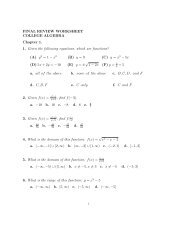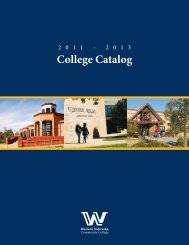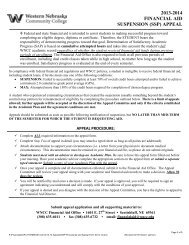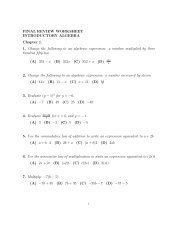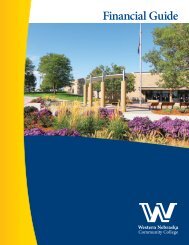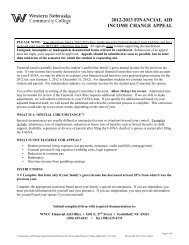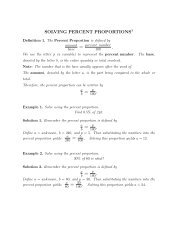WNCC 2010 Self-Study Report - Western Nebraska Community ...
WNCC 2010 Self-Study Report - Western Nebraska Community ...
WNCC 2010 Self-Study Report - Western Nebraska Community ...
Create successful ePaper yourself
Turn your PDF publications into a flip-book with our unique Google optimized e-Paper software.
• Intercollegiate Athletics<br />
Athletic programs at <strong>WNCC</strong> are designed to develop a value system for students and to<br />
assist student-athletes in preparing themselves academically, physically, and socially to<br />
fulfill a meaningful place in society beyond <strong>WNCC</strong>. The College’s athletics program is<br />
centered on the following twelve guiding principles: adaptability, compassion,<br />
contemplation, courage, honesty, initiative, loyalty, optimism, perseverance, respect,<br />
responsibility, and trustworthiness (RR 53).<br />
Core Component 2c: The organization’s ongoing evaluation and assessment<br />
processes provide reliable evidence of institutional effectiveness that clearly<br />
informs strategies for continuous improvement.<br />
<strong>WNCC</strong> has ongoing evaluation and assessment processes in place to gauge institutional<br />
effectiveness and for continuous improvement.<br />
Assessment of Student Learning<br />
<strong>WNCC</strong> instructors and other employees utilize a variety of methods to ensure that students are<br />
mastering the material in subject areas they study. Besides course, program, and general<br />
education level assessment measures (further detailed in Criterion 3), external tools are used for<br />
comparative purposes to gauge student achievement or to identify gaps where improvement can<br />
take place, and reports are created and the information disseminated to the institution at large<br />
about the results. The successful educational experience for students begins with accurate and<br />
consistent placement into the courses for which the students are prepared, as discussed below.<br />
Course Placement Instruments<br />
Since 1986, <strong>WNCC</strong> has used ASSET and more recently eCompass tests for mandatory placement<br />
in English, reading, and mathematics courses. If are inadequately prepared in those academic<br />
areas, the College has courses to help students develop the skills necessary to succeed in collegelevel<br />
courses (RR 54).<br />
As previously outlined, a new academic division, the Division of Academic Enrichment, was<br />
created during the summer of 2008 to house the developmental education courses (two levels of<br />
writing, two in reading, and three math levels). A Chair and four full-time faculty members are<br />
assigned to the division, with instructors from other divisions as well as adjunct instructors also<br />
offering courses as needed.<br />
Performance <strong>Report</strong>s<br />
One of the ways in which <strong>WNCC</strong> attempts to triangulate learning results or to verify independently<br />
the learning achieved during a course of study at the institution is through the administration of<br />
standardized tests. The College utilizes the Collegiate Assessment of Academic Proficiency<br />
(CAAP) test at the point of graduation, and degree-seeking students are required to take the CAAP<br />
test before receiving their degree. Faculty and staff members review the results to confirm<br />
program strengths and to identify areas that need to be strengthened. <strong>WNCC</strong> test results are<br />
usually aligned with national norms. Examples of the CAAP test results follows:<br />
<strong>Western</strong> <strong>Nebraska</strong> <strong>Community</strong> College Page 87



